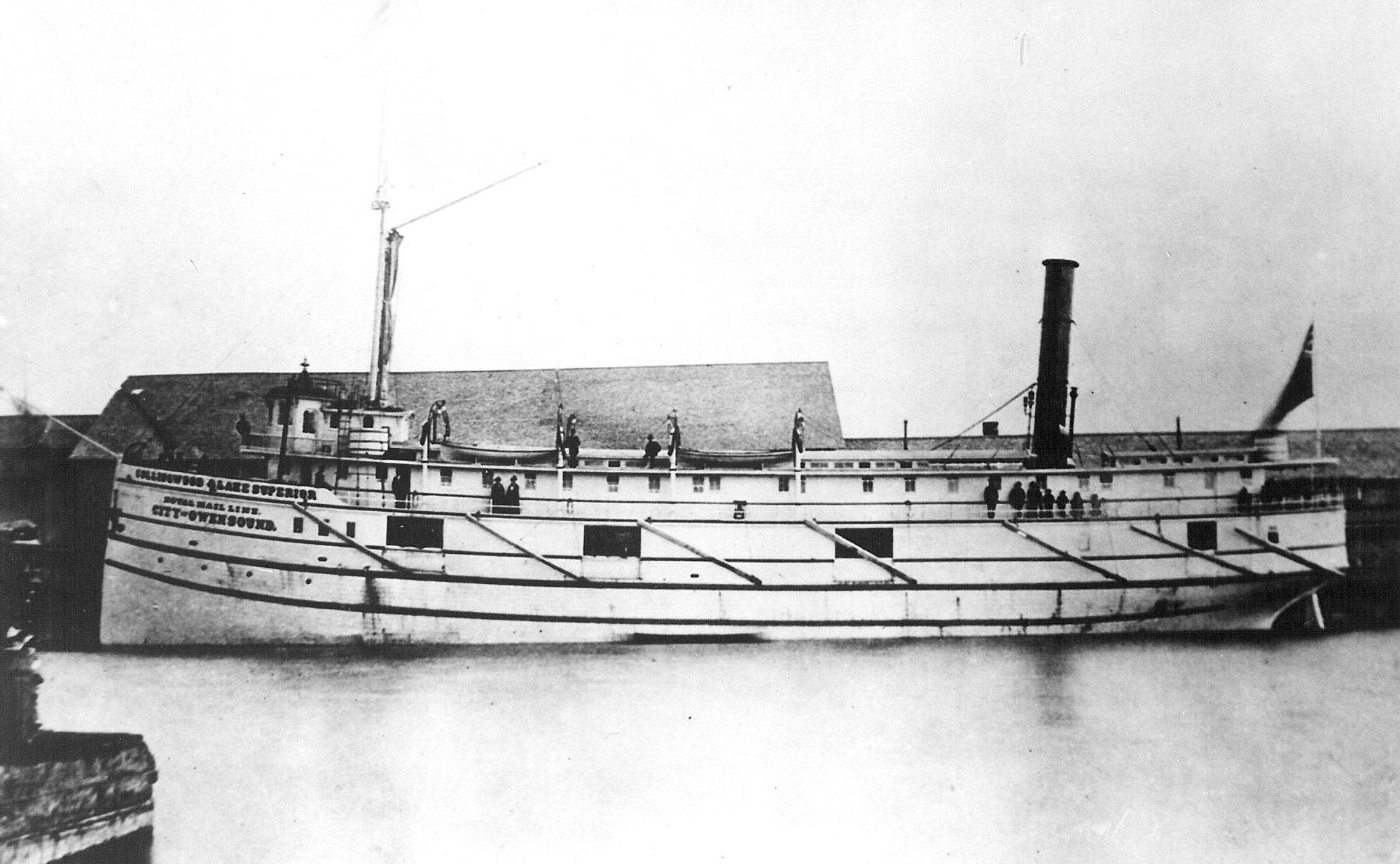Shipwreck: City of Owen Sound
Skip Gillham
Vineland, Ontario, Canada

The wooden hulled cargo and passenger steamer City of Owen Sound was built by John Simpson and launched at the Georgian Bay community of Owen Sound, Ontario, on June 15, 1875. The vessel was 172 feet long, 31 feet wide and registered at 898 gross tons. The low pressure engine generated 280 indicated horsepower and had been salvaged from the City of London, which had burned at Collins Inlet on August 20, 1874. A single firebox boiler generated the steam requirements and burned wood.
City of Owen Sound entered service for Smith & Keighley on July 1, 1875, sailing for Meaford, another Georgian Bay community. It operated on behalf of the Chicago and Sarnia Line in conjunction with the Grand Trunk Railroad. The vessel often loaded salt at Kincardine, Ontario, for Chicago and returned with grain for one of the Georgian Bay ports. During the winter of 1876-1877, the passenger cabin was extended along the upper deck providing more staterooms and a new galley. This increased passenger accommodation to 100 and tonnage to 1,092.93 gross tons.
In 1877, the ship served the Collingwood and Lake Superior Line and operated between Collingwood and the Lake Superior port of Fort William, now part of Thunder Bay, Ontario. It made stops on demand along the route and is shown in a photo from the collection of the Milwaukee Public Library. The first of what became a nightmare of problems for the ship occurred on September 4, 1879, when it hit bottom and broke the rudder.
Ownership was reorganized as the Canada Transit Company in 1881 and then, about 1887, it became the Canada Lake Superior Transit Company.
On October 16, 1881, City of Owen Sound ran aground on a rock in the North Channel of Lake Huron about 10 miles north of the Manitoulin Island community of Gore Bay. The vessel was loaded with 30,000 bushels of wheat and some had to be lightered before the ship floated free. Since the rudder was jammed, the freighter was towed to Gore Bay for repairs.
After making 18 trips to Duluth in 1883, City of Owen Sound was rebuilt over the winter and given wooden arch braces. In addition, the boiler was converted to burn coal rather than wood.
The next winter found the ship aground in the Michipicoten River. It had stranded there during November and was not released until spring. Taken to Owen Sound in June, the vessel remained idle until repairs were undertaken in November. Things went from bad to worse. On October 24, 1887, the ship, loaded with 24,500 bushels of corn and 411 packages of fish, hit the infamous Robertsonís Rock in the North Channel of Georgian Bay and sank. All on board were rescued but the upper cabins were washed off as the City of Owen Sound went down.
After four years on the bottom, efforts to refloat City of Owen Sound began in July 1891 and finally succeeded in the fall. The hull went aground again while under tow for Little Current, Manitoulin Island, and the vessel spent another winter stuck on the bottom.
In August 1892, the ship reached Collingwood and it was rebuilt there as a steamer for the lumber trade. It finally returned to service on November 15, 1892, sailing to Parry Sound for a load of lumber for Oswego, NY on behalf of the Collins Bay Rafting and Forwarding Co.
The wayward freighter ran aground again on November 5, 1895. This time it stranded off the Bruce Peninsula and was abandoned. Salvage later in the month found severe damage and it was back to Collingwood for another round of winter repair work. Perhaps a new name would change the luck and the vessel resumed service in 1896 as Saturn. The ship spent five more years in Great Lakes trading before being lost for good. It was en route from Cleveland to Owen Sound with a cargo of coal when it began to leak on Lake Huron and sank northeast of Southampton, Ontario, on September 19, 1901. The crew came ashore in the lifeboat after a grueling 7 hour, 30 minute battle with the elements.
At a depth of 85 feet, there was no temptation to salvage the ship. For the past 109 years, the former City of Owen Sound has remained on the bottom as it had for 6 winters of its 26 year sailing career. The cold Great Lakes had finally won.
Back to top
